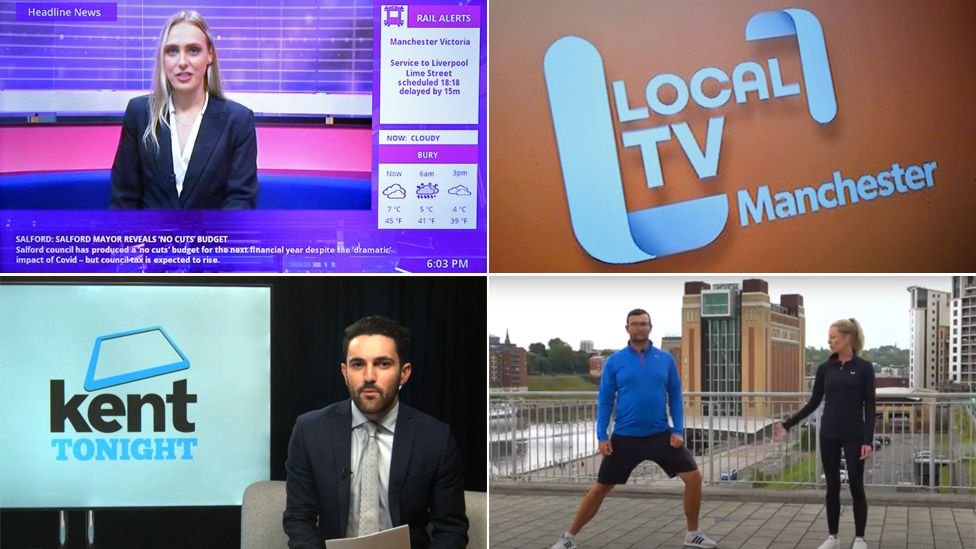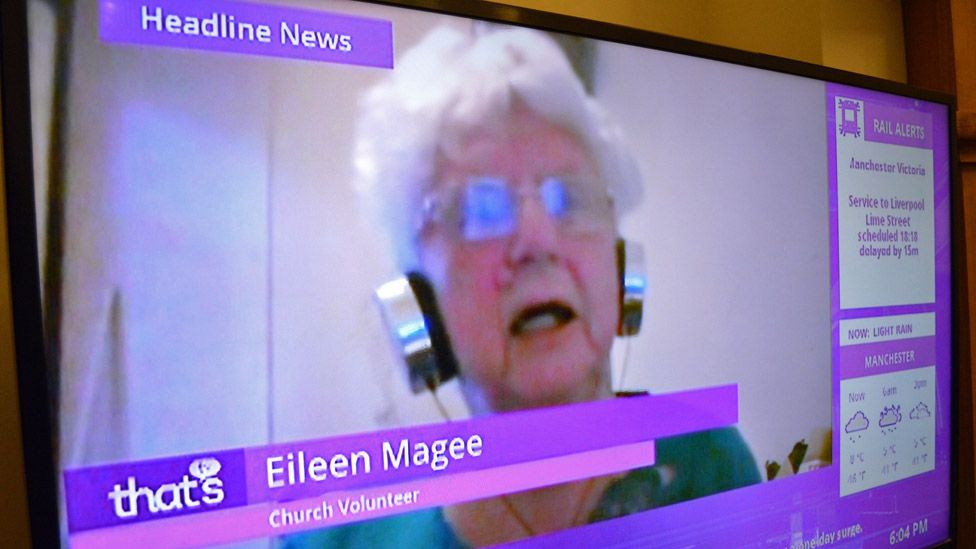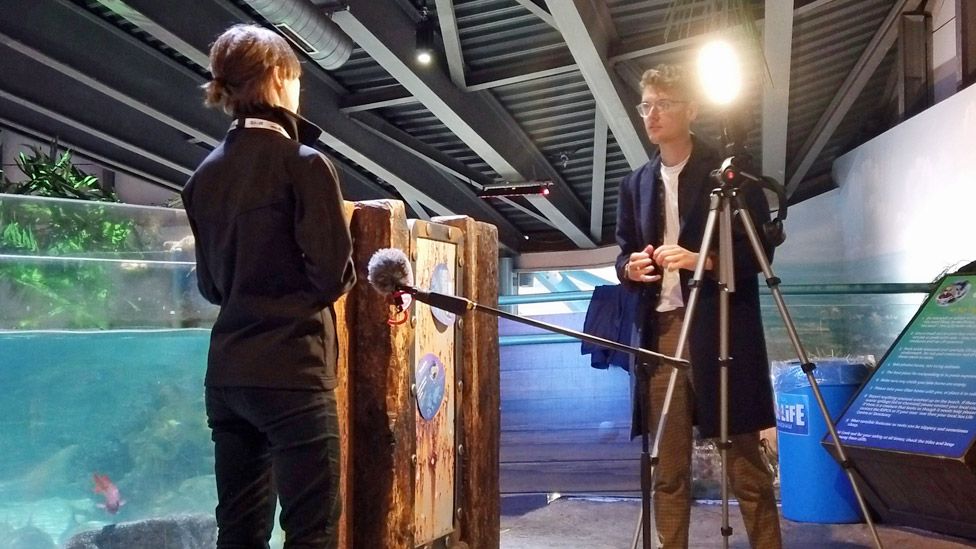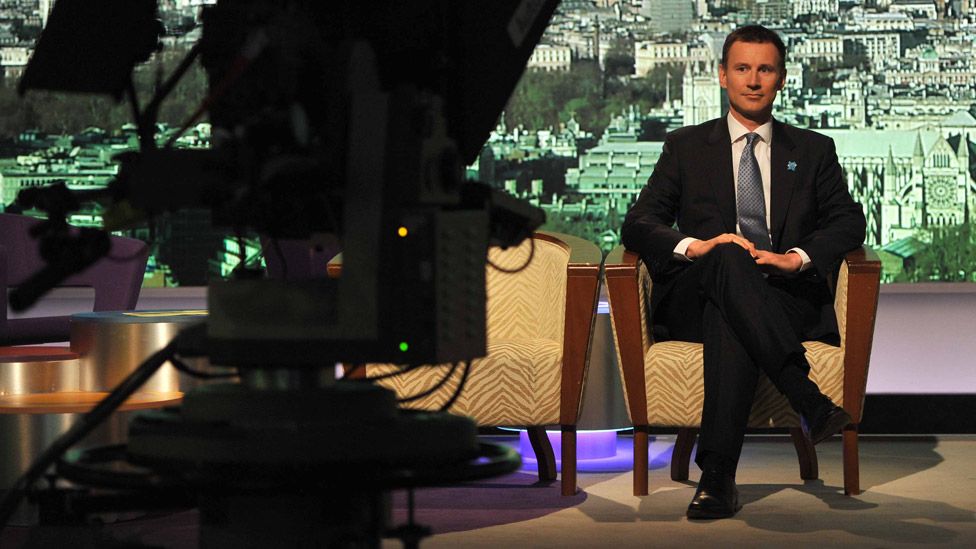
A decade ago, a plan for new local TV channels to provide "a new voice for local communities" was set out by the government. Since they launched, the local identities and ambitions of many have eroded, but their operators insist they have fulfilled the original aim.
TV channels for towns and cities around the UK would "transform lots of communities", broadcast leadership debates for councils and police commissioners, and provide "probably the biggest shake-up in our broadcasting landscape for two decades".
That was the idea behind local TV - Jeremy Hunt's big vision as culture secretary 10 years ago.
Since then, 34 stations have launched from Manchester to Maidstone, Bristol to Belfast, each given a prime slot on the Freeview TV guide.
However, many soon struggled financially and have been hit further by the pandemic, meaning local programming has been pared back. Now, many viewers probably don't realise they are watching a local channel at all.
The biggest operator has removed the locations from its channel names - so That's Manchester, That's Swansea Bay, That's Hampshire and the company's other 17 stations are all now simply known as That's TV, while the company bills itself on its website as "the home of classic TV".
That's TV's only local programming is now a 10-minute news bulletin every weekday, with the rest of the schedule being a diet of nostalgic music videos and teleshopping.

That's TV chief executive Daniel Cass says he cut local programming to the single 6pm bulletin for each channel because of Covid.
"We're working really hard to deliver the best possible news service we can during the pandemic," he says.
His channels are "maintaining the absolute minimum staffing to get a news programme out within very limited office space", he explains. But it was proving impossible to keep their previous schedule, which relied heavily on repeats, up-to-date when news about the pandemic changed so fast.
Regulator Ofcom has relaxed broadcasters' commitments during the pandemic. The BBC also cut back on some regional programming for a spell and is separately making permanent cuts to its regional programming.
And London's local TV service, London Live, has cut its news entirely during the pandemic and was censured by Ofcom for a "potentially harmful" interview with conspiracy theorist David Icke.
Once the pandemic is over, however, Mr Cass says his channels will go back to broadcasting the number of local hours that are required by Ofcom.
But the challenges and concerns about the local-ness of local stations existed before Covid.
That's TV snapped up most of its 20 Ofcom local licences after the original broadcasters found it wasn't commercially viable to run a small, truly local operation. In 2019, That's TV and other channels asked Ofcom for permission to cut their local programming, and That's TV lost some of its studios.
'Forgotten' towns and cities
By February 2020, That's Manchester was airing half an hour of local news a day - which was repeated, with occasional small adjustments, over several hours. Syndicated generic documentaries and teleshopping filled the rest of the schedule.
While some might have hoped for more fulsome local news, discussion and lifestyle programming, Mr Hunt actually said channels could broadcast local shows for as little as an hour a day, with the rest coming from a syndicated national schedule.
And Ofcom said the content of the single hour didn't all even have to be new. The regulator said a 15-minute bulletin repeated four times could count as each day's hour of original local programming, as long as it was updated if necessary.
So local TV channels could make as little as a quarter of an hour of local TV a day.
Even the current 10-minute bulletin - including adverts - is more dedicated local TV news than viewers in areas like Scarborough or Salisbury get from the BBC or ITV, Mr Cass adds. "We are delivering a voice for 'forgotten' towns and cities that is entirely consistent with the government and Ofcom's vision for local TV," he says.

Elsewhere, channels in another eight areas including Liverpool, Leeds and Bristol are run by Local Television Ltd, which is chaired by former Daily Mirror chief executive David Montgomery.
They each make a half-hour bulletin mixing local and national stories, which is repeated for six hours every weekday over breakfast, lunchtime and early evening. "The local stories lead and the national stories support, and there are more local stories than national," says chief executive Lesley Mackenzie.
She says features during the pandemic have included State of the Streets, showing viewers how busy their town centres and parks are; vox pops to gather local views; and exercise videos for the elderly in the north-east.
Rather than sitting in studios, Local TV Ltd's presenters film their reports on the streets on iPhones, edit them on iPads, and will upload them to websites and social media as well as putting them on air.
"The old-fashioned model was not sustainable but we're moving to a much more lean, mean and efficient [model]," Ms Mackenzie says.
'On a shoestring'
Meanwhile, most of the rest of the day's schedules are filled by Judge Judy repeats and generic documentaries. "Our ambition is constrained through funding, and I do believe we do offer a voice for local communities," she adds.
The company is so confident in the appeal of local TV that it even launched a new channel in Manchester on Freeview channel 99 last week to rival That's TV, which fills the city's official local slot on channel seven.
In Sheffield, Belfast, Nottingham, Brighton and Maidstone, independent local channels have managed to keep going, often relying on volunteers or students to make more local programming then their larger counterparts.
Maidstone's KMTV has a partnership with the University of Kent, and screens programmes covering local news, sport, business and politics, as well as one-offs like an overnight 2019 general election results show.
"We did that on an absolute shoestring," says KMTV's David Powell, who also chairs the Local TV Network, the sector's trade association.
"It was hard work, but we did it. We covered all of our local MPs' counts and got interviews with them so our loyal audience - which by 5am probably wasn't that great - got local perspectives and they gained something from that.
"Our local MPs and local councillors who appear [on KMTV] value it immensely. It's a chance to get their voice out and we can interrogate them and ask them difficult questions."

But the channel can only survive thanks to journalism students and a contract with the university to carry out other filming and run virtual open days.
"We would love to do more local content but we've got no money for it," Mr Powell says. "We've got a lot of people saying, we want local democracy, we want local broadcasting. But actually there is never the resource to go with it."
The government asked the BBC to subsidise the local network at first, but the last of the corporation's £37.7m funding was paid last summer.
And many who were sceptical about the success of local TV a decade ago have not changed their minds.
'A silly idea'
Ed Vaizey, who was a culture minister when Mr Hunt came up with the idea, thinks the government has "completely forgotten about it". Lord Vaizey now sits on the House of Lords communications committee, and admits he has too.
"I thought local TV was a silly idea from the get-go," he says. "We don't have the right ecosystem in the UK to support local television and it never really took off in any shape or form.
"Local TV might have made some difference in that it might have given media opportunities to young people who might not have otherwise got those experiences, and might have occasionally produced new content. But I've long ago lost touch with local TV."
The channels are "taking up an important space" on the Freeview guide, he adds.
"I think the government should grab this by the scruff of the neck and make a decision, either to rejuvenate it or to let it go, and I suspect the answer is to let it go and look at much better opportunities to support local journalism."
Steven Barnett, professor of communications at the University of Westminster, agrees that local TV hasn't lived up to expectations. "It was a nonsense plan from the beginning, frankly," he says.
Hits and misses
"One by one all the stations have gone to Ofcom cap in hand and said, 'Please will you relax the various requirements [for] local content and local journalism?'
"The other thing that happened is consolidation. It's become one organisation running the show centrally with tiny local opt-outs now and then.
"The idea of a genuine commitment to serving the local community, providing information or getting local entertainment was great, but he [Mr Hunt] just never trusted ordinary local people with the money and the organisational ability to do it."
Kerry Traynor from the University of Liverpool's Department of Communication and Media says she was "one of the optimists", but that the economics of local TV were "always going to be a challenge".
"I would have liked to have seen it survive with more public subsidy," she says, citing government support that has allowed greater grassroots local involvement in countries like Germany, Spain and Canada.
"There are some with strong local roots that are still going, still pushing through, like Brighton, Sheffield and Belfast," she says.
"There have been many others that have just been bought up and applications have been made to Ofcom to reduce the local programming and local content. There have been some hits and some... not-so-hits."
A decade ago, the promise to "transform lots of communities" may have raised expectations to an unrealistic level - but local TV operators insist they are following the core of Jeremy Hunt's original vision.
"We're trying to run it as a commercially viable business consistent with the vision for local TV that Jeremy Hunt set out, which is some local news within a network channel," Mr Cass says.
"His vision was very clear and precise and we're following it to the letter."
"local" - Google News
February 09, 2021 at 09:04AM
https://ift.tt/3p5QuuG
Whatever happened to local TV? - BBC News
"local" - Google News
https://ift.tt/2WoMCc3
https://ift.tt/2KVQLik
Bagikan Berita Ini














0 Response to "Whatever happened to local TV? - BBC News"
Post a Comment